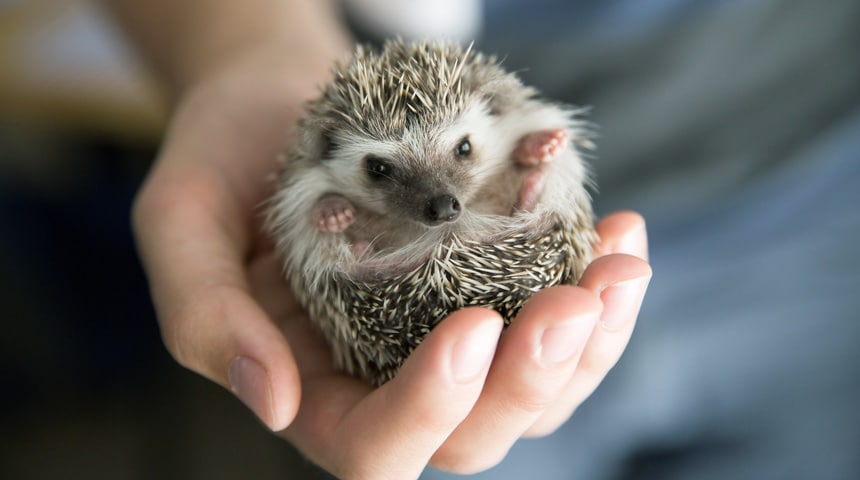
Diet
The African pygmy hedgehog (or white-bellied hedgehog) is an omnivorous animal. A captive animal’s diet must be composed mainly of dry hedgehog or cat food (pellets) that is high in protein and low in calories (food for indoor cats or for weight control). Insects such as crickets or mealworms can be given in small quantities (1 teaspoon per day). Waxworms should be avoided as they have a much higher fat content. Dairy products and eggs should also be avoided. A variety of fresh fruits and vegetables can also be offered (around 1-2 teaspoons per day). An adult male should weigh between 450 and 600g, whereas a female should be between 250 and 400g. It is important to monitor their weight as hedgehogs often become overweight. It is thus recommended to weigh your hedgehog once a week to detect any variation in weight.
Housing
Hedgehogs are solitary, nocturnal animals who are very active but prefer a calm environment. They can be kept in a large, wired cage with a plastic bottom, a 15-20 gallon aquarium or even in plastic bins connected together by PVC tubes. A living space of 8 square feet is recommended. Towels should be used to cover the bottom of the cage and approximately 10 cm of absorbent substrate can be added to allow the hedgehog to dig and hide. You must however be very careful that the towels do not have any loose strings as these could easily get wrapped around their legs. Also include little hiding places, such as cardboard boxes, small plastic houses, or any other shelter in which they can hide. Hedgehogs can be trained to use a litter box but will typically urinate and defecate at night while exercising in their wheel. Hedgehogs risk entering a state of torpor when they get cold. For this reason, the ambient temperature must be maintained between 24°C and 29°C at all times. If the room temperature is below 24°C, a heat source such a ceramic lamp or a heating pad must be provided.
Particularities
Captive hedgehogs have a life expectancy of 4 to 6 years, the record being 8 years. Hedgehogs are asymptomatic carriers of Salmonella, a bacteria known to cause, among other things, diarrhea in humans. Young children and immunosuppressed people must be particularly careful and must wash their hands after handling their pet. Hedgehogs have poor vision but a good sense of smell and good hearing.
Julie Hébert, DVM, Dipl. ABVP (avian practice)
Édouard Maccolini, DMV, IPSAV (zoological medicine), Dipl ABVP (avian practice)
Sarah Alberton, DVM, IPSAV (zoological medicine)
Kim Langlois, DVM

